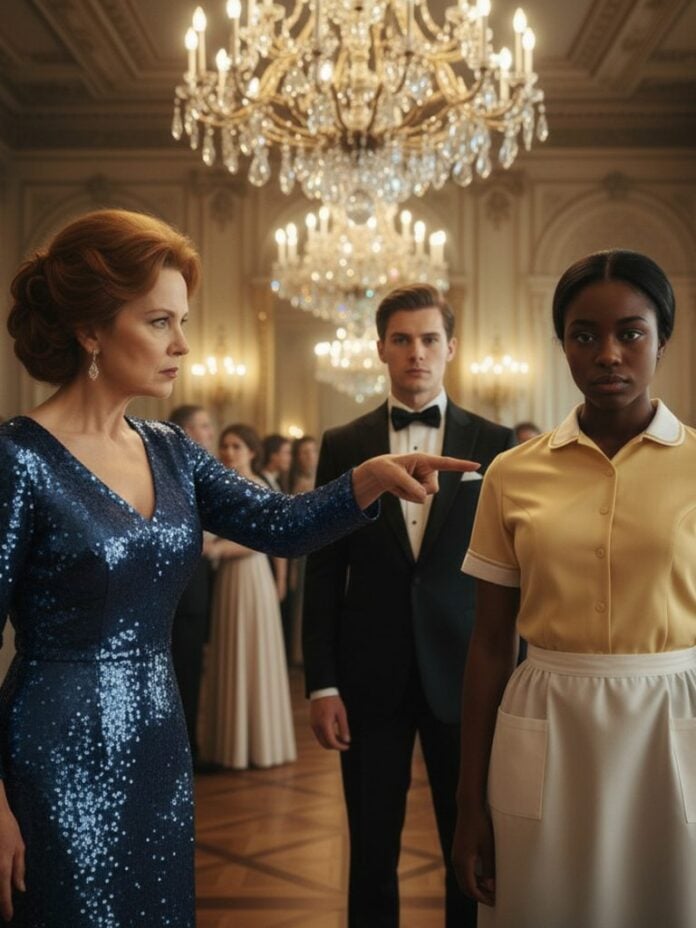In a gleaming new Midtown tower lobby, a grand launch event played out just as the real-estate world expects: marble floors gleamed, crystal chandeliers sparkled, a string quartet performed as two hundred guests drifted among trays of chilled champagne. The crowd—private-equity types, philanthropists, luxury-brand insiders—congratulated themselves on yet another urban luxury win, exchanged cards for sponsorships, talked weekend ballroom-dance classes and kids’ performing-arts education while eyeing the contemporary art on the walls. It was polished to perfection.
Amid the shimmer, Kesha Maro (wearing a uniform and a badge reading “K. Williams”) moved almost invisibly along the edge of the event. She was hired not to draw attention but to sweep footsteps, smooth fingerprints, and remain unseen. Yet her graceful bearing betrayed a body that once knew rhythm and movement intimately. Nearby, the host William Thompson accepted accolades for the tower that bore his name, while the room buzzed with name-tags and whispered philanthropy.
Suddenly, the polished scene fractured: a tray skidded on the slick marble, passed the string-quartet’s bows and shattered in a glittering spray of glass at Kesha’s feet. The room momentarily hovered between concern and curiosity—but instead of help, a dismissive laughter greeted the crash. William seized the moment theatrically: “If you can dance a proper waltz here and now, I’ll marry you to my son.” His joke echoed in the hush of champagne flutes. The room tittered uneasily, Jonathan, his son, winced. Kesha bent, gathered the shards, composed herself—and accepted.
As the quartet restarted, the room looked on. Victoria, the host’s wife, glided onto the dance floor first—her moves polished, rehearsed, the expected entertainment. Then came Kesha. She closed her eyes, drew a breath, and moved. From the first step she transformed the floor: the lobby ceased to be just a stage for luxury—it became her arena. Her turns were long and clean, her timing subtle and exact. The guests, once spectators in a gilded room, fell silent. They watched not a performance meant for their amusement but a quietly commanding display of art—and of dignity reclaimed.
When the music ended, the applause rose, shook the room loose from its gloss, and Kesha’s name rippled through the crowd: Kesha Maro—the ballerina once hailed as a revelation, who vanished after a terrible accident. She stepped forward in her uniform and said softly: “I changed uniforms. I didn’t change who I am.” The silence that followed carried more meaning than any toast. William tried to shrug it off as a jest, but Kesha met him with simple demands: an apology, and a donation equal to the night’s floral budget to a youth dance program of his choosing. “Promises aren’t lighter because a glass is in your hand,” she added.
In the weeks that followed the video circulated beyond the tower’s lobby. Invitations came: a conservatory offered her a guest residency, a Bronx school asked for a workshop, film producers reached out. But what moved Kesha most was children she once taught pooling twenty-three dollars asking if she would return. Within six months the Maro Center for Dance and Music opened: beginner ballet for adults who thought it too late, scholarships for kids who never thought it possible, community nights for anyone to learn to waltz without worrying about etiquette. Jonathan—once the host’s son, now a donor—attended the ribbon-cutting, funding a year of free classes for neighborhood students. The tower management began to allocate meaningful arts grants. And Marcus, the security supervisor who’d once recognized her, watched children practice under Kesha’s quiet mentorship.
The better story here isn’t the fall or the applause—it’s the dignity that travels: the cleaner who startled a gala into remembering what it means to look up; the son who turned awkwardness into support; the lobby that became more than a backdrop. If you can waltz, you can change a room. If you can change a room, you can change a life. In the heart of a city built on deals, Kesha reminded everyone what happens when you step in, not out—and lead with rhythm, respect, and the floor under your feet.



